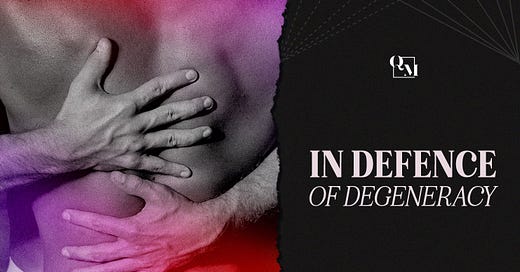Gay marriage, the selfish gene rides again, and for the love of degeneracy
Since I’ll be away on holiday for a few weeks (I’ll be back properly on October 2), I am giving in to self-indulgence and scheduling some posts to share a few old (non-Substack) pieces and appearances of mine, just to keep things running during my absence.
One of these posts you are seeing right now, in the future, while I, also in the future, am reclining on a sun lounger or otherwise (un)usefully employed somewhere (and of course I am saying all this to you from the past).
And so we begin with…
Disestablish it for its own good: The Church of England and gay marriage (OnlySky Media, January 18, 2023)
I followed with amusement the recent fracas over same-sex marriage in the Church of England. For half a decade, the Church has been debating its doctrines relating to sexuality, and the thought of gentle Anglicans worrying over the finer points of gay sex has elicited from me a chuckle or two over the years. Now this long consultation by the “sheep in wolf’s clothing” (as somebody once called the CoE) is finished, and recommendations have been made for the General Synod to vote on.
There has been some progress. The celibacy rule for gay clergy is to be tossed out, for one thing (how interesting those conversations must have been). But on the big issue of gay marriage, the CoE has reiterated its ban. So gay Anglican clergy will be able to have sex with their partners, but not be married in their own Church—such is the logic of those venerable old sheep.
I say I have followed all this with amusement because, in one way, it is such a non-issue. The CoE’s long decline continues unabated and the British population becomes more secular by the day, so what does it matter? Small religious sects, unattractive as they often are, are perfectly within their rights to make their own rules.
Continue reading here.
An epilogue to this piece. When I first shared it on Twitter (or X or whatever), I tagged Calvin Robinson, at whom I poke some slight fun in the article. I was surprised when he liked the tweet—and then very amused when he blocked me not long after doing so! I can only presume that he hadn’t read the piece when he liked my tweet. Ah well. I forgive the padre.
J. Arvid Ågren—The Gene’s-Eye View (Two for Tea podcast, April 2022)
One of the Two for Tea episodes I occasionally co-hosted with my friend and Areo Magazine editor Iona Italia. This is one of the most enjoyable public conversations I’ve ever had. It concerns the gene-centric view of evolution as most famously expounded by Richard Dawkins and about which Ågren wrote an excellent book (which I had reviewed in Areo before our conversation).
In Defence of Degeneracy (Queer Majority, August 23, 2023)
Salman Rushdie’s 1995 novel, The Moor’s Last Sigh, relates a legend about the protagonist’s great uncle, Aires da Gama. On his wedding night in 1921, Aires, a gay man, majestically dons his wife’s wedding dress and absconds through a back door to meet his male lover, who sails them away across the waters of the Cochin coast as Aires’s wife looks on from the window. Moraes “Moor” Zogoiby, our eponymous narrator, later wonders whether his mother’s famous painting of this scene “[W]as a domesticating fantasy, only conventionally outrageous: that the story, as told and painted, put Aires’s secret wildness into a pretty frock, hiding away the cock and arse and blood and spunk of it, the brave determined fear of the runt-sized dandy soliciting hefty companions among the harbour-rats…”
But ultimately, the Moor concludes, “No, sir. The painting’s authority will not be denied… The nakedness beneath the borrowed wedding outfit, the bridegroom’s face beneath the bridal veil, is what connects my heart to this strange man’s memory. There is much about him that I do not care for; but in the image of his queenliness, where many back home (and not only back home) would see degradation, I see his courage, his capacity, yes, for glory.”
So, can there, as this passage suggests, be beauty and even transcendence in what many would describe as degeneracy?
I believe that there can be and that there often is.
Why should casual, even anonymous sex not be a thing of beauty? Yes, there is the “blood and spunk of it”, and there can be great dangers as well as great pleasures in such things, but who is to say that a fumbling suck or fuck in some forlorn cruising spot cannot involve a moment of deep human connection? And even if it does not, when people meet in such circumstances and simply enjoy each other: is that not enough?
Continue reading here.
Till next time, then!



